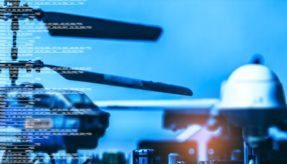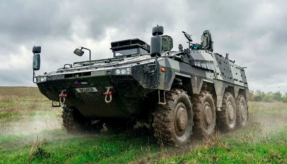
Defence and Security Accelerator (DASA) have announced a new competition for July that will seek proposals to develop solutions for autonomous sensor management and sensor deception in intelligence, surveillance and reconnaissance (ISR) scenarios.
This competition is the first phase of a competition being run in support of Dstl’s Sensor Fusion and Management (SFM) project which leads on generation-after-next sensor fusion and management research.
Key dates and funding
The full competition document will be launching soon, this is advanced notice of the challenges so that you can sign up to the webinar which will be taking place on 20 July.
The webinar will include a briefing from the technical experts in Dstl followed by an opportunity to ask questions of the competition team. Sign up here: Eventbrite page.
A total of £800,000 is available for this competition, with the intention of funding multiple proposals. Phase I projects will aim deliver Phase I outputs at TRL 3. Projects should aim to be one year in duration and must complete by February 2025.
Background and challenges
Full-spectrum, pervasive ISR is one of the Ministry of Defence (MOD) five key capability challenges as outlined in the Science and Technology Strategy. In order to realise the ambition of addressing ISR needs at scale and at pace, it is vital to achieve a high degree of autonomy in the processes that underpin the ISR enterprise.
Autonomous sensor management is the process of deciding and executing the actions that a group of sensors should take in a given scenario to complete a particular ISR task. In a world of increasing complexity in terms of sensor number and capability, there is a need for algorithms which will process information and disseminate instructions to address ISR queries at human or beyond human-tempo.
Methods which detect and counter activities designed to deceive the ISR picture are crucial. This is important not only because adversaries inherently hide their intent and will project false intent, but also because defence scenarios are nearly unique in this respect, and therefore drawing across techniques from more benign or cooperative situations has limited utility. Techniques must be developed which have the accommodation for potentially deceptive activity built-in.
Dstl’s principal evaluation and testing route for novel algorithms of this type is via Stone Soup which is an open source software framework. This competition will be seeking ideas that could integrate with this framework.
Challenge 1: Sensor Management
Sensor management objectives could include searching for objects of interest, target detection, identification, recognition, tracking or improved situational awareness among many others, including complex multi-objective problems. For example a UAV may be required to observe an area to find and track objects of interest. The actions required to search for targets are quite different to those required to track, and so competing objectives will have to be balanced.
The actions a sensor could take encompasses tasks such as pointing direction, field of view, beam pattern, sensitivity, power status etc. The tasking of sensor location is also of interest, primarily as a dynamic problem where a sensor can be moved during a scenario (e.g. it is attached to a platform such as an unmanned vehicle), but also in terms of optimising static sensor placement.
Sensor management algorithms are well explored in academic literature but difficult to implement due to the practicalities of the problem (large sets of possible actions to optimise over). This means the autonomous sensor management methods applied to real scenarios are still largely heuristic, with humans anticipating new targets, sensors and applying context. This is suboptimal and unsustainable in scenarios of increasing complexity and autonomy.
Initial work has been done to experiment with sensor management approaches using the Stone Soup framework. Simple enactments of sensor management are available on the documentation site.
In the first instance, additional sensor management capabilities are required which are compatible with Stone Soup and this existing setup. The second key element of this request is to demonstrate autonomous sensor management by applying the algorithm(s) implemented in simulation. A scenario should centre on a specific objective (or objectives), with sensor actions selected in order to maximise some reward (or minimise cost).
Possible component developments could include:
- Reward functions
- Cost functions
- Sensor management policies
- Optimisation approaches
- “Taskable” sensor models
Research areas that might help solve this challenge area may include but are not limited to:
- Information theory
- Game theory
- Reinforcement learning
Challenge 2: Sensor Counter Deception
Military sensing is often complicated by the fact that an adversary’s objective is in direct conflict with ours. Adversaries will therefore work hard to obscure their intent, for example by hiding, manipulating their signature or deploying decoys and countermeasures. This complicates inference and means any useful ISR picture compilation must be robust to such activity. Furthermore, behaviour like this is not confined to a single domain or single sensor modality. Indeed, techniques found in certain scenarios have analogues in others (e.g. radar jamming/optical dazzle).
The SFM project, under a mandate to improve ISR picture compilation, looks to develop and demonstrate methods to counter sensor deception. Furthermore, it seeks to develop techniques to enable an understanding of the impact deceptive strategies have on a situation awareness picture. Impact may range from an increase in uncertainty, to attempts to inculcate a false conclusion, or promote a decision conducive to the deceiver. Solutions should employ a defined and recognised set of ISR metrics, an example of which can be found here to quantify the impact of sensor deception, as well as delivering strategies to mitigate such deception. Solutions should further be Stone Soup compatible and should allow Dstl to derive and compare metrics which quantify the effect of a range of deceptive activities. Dstl will work with the supplier to arrive at a common understanding and direct how best to deploy novel algorithms in Stone Soup.








